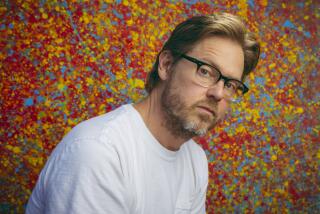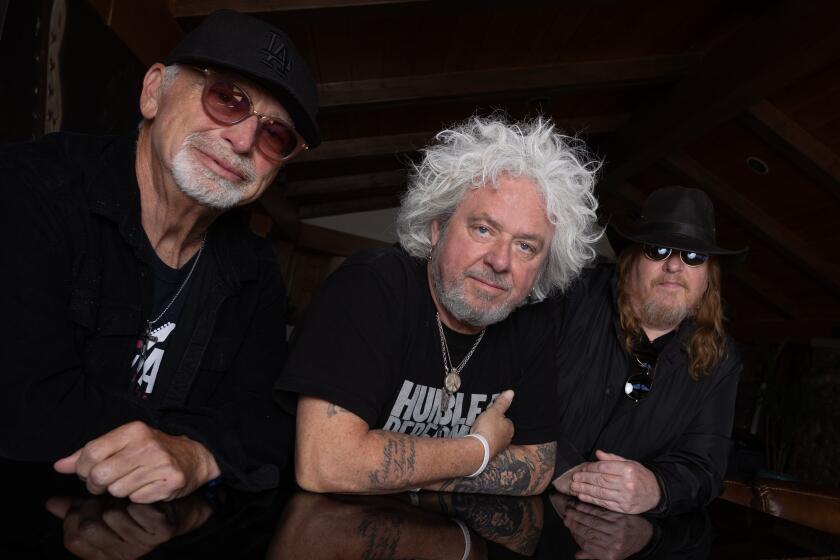Will It Be a Happy Return?
“You know I’m not dead,” Billy Corgan declares in the opening line of “MACHINA/the machine of God,” the Smashing Pumpkins album due in stores Tuesday.
As if to underscore the remark, the music itself on the song “The Everlasting Gaze” is filled with the kind of stirring guitar lines that have long been a sign of self-affirmation in rock.
Yes, Corgan, one of the most acclaimed figures in ‘90s pop, has reembraced rock ‘n’ roll after the icy numbness of “Adore,” a 1998 collection that reflected mounting trauma in his life, including his divorce and the deaths of his mother and Pumpkins tour keyboardist Jonathan Melvoin.
“Adore,” a daring and difficult work, fared so poorly commercially that some wondered whether the proud Corgan would call it quits. With other leaders of ‘90s rock (such as Nirvana and Soundgarden) disbanded or often on the sidelines, some called “Adore” the end of an era.
But the Pumpkins, whose current lineup features guitarist James Iha, original drummer Jimmy Chamberlin and new bassist Melissa Auf Der Maur (from Hole), return full of energy in “MACHINA,” and the band is on a cross-country series of record-store appearances and club dates to help promote it. An L.A. stop is expected the week of March 5. A formal tour will follow.
In an interview, Corgan, 32, addressed the state of rock and life after “Adore.” (See review, Page 75.)
Question: What are you trying to tell us in the opening line--renewal in your life, in your career or in rock itself?
Answer: The line is said with a wink and a smirk, so don’t read too much into it. But I will tell you that I personally feel great.
Q: What’s your feeling about rock? It seemed in “Adore” that you were losing interest.
A: I think the biggest part of that was that I felt kind of a cultural malaise . . . , that something I held so dearly to my heart was kind of just becoming yet another thing. . . . Something that got compromised and co-opted, and I think I was right about that.
Q: What about rock now?
A: I think there is still a strong desire [by audiences] to feel the real concert experience, the visceral part of it, but I’m not sure it is really being given to them. My feeling is there are a lot of kids who have heard about the myth of rock ‘n’ roll, but they haven’t actually seen it.
Q: How close do you feel to rock yourself?
A: In some ways, I feel like I’m sitting on some remote mountain casting stones down when I talk about what’s going on now. I’m not in it. I don’t live it anymore.
Q: What do you mean?
A: I think there’s a point in your life where it all congeals . . . the lifestyle, the sexuality, the drugs. That’s why the most potent, most visceral rock music is usually played by people in their 20s. That’s not to say that you can’t rock later, but I think that “from the loins” part of it goes. At one time with us, there was no distinction between what went on backstage and onstage. It’s still visceral to us or we wouldn’t do it, but it’s also theater now. We don’t live it every minute.
Q: Before “Adore” was released, you were anxious about the way that it would be received. You said that if it was a hit, people would call it a triumph, but if it didn’t sell, people would call it “Billy’s little art project that went awry.”
A: Well, I pretty much called that, didn’t I? [laughs]
Q: Were you disappointed that the pop world seemed so quick to turn on the band and the album?
A: I did feel a little burned . . . , that people were sticking forks in us, like making us pay for other people’s sins. It’s not my fault and my band’s fault that alternative rock didn’t fulfill its promise. As far as I can tell, we fulfilled our promise and I think we have stayed on that course.
Q: What music were you listening to personally while making the new album?
A: Mostly I listened to ‘70s and ‘80s heavy metal, probably because I listened to a lot of it as a kid and it has no political tone. I can’t listen to alternative rock without thinking where I fit into that--and that kind of ruins it for me. We went to Japan on the “Adore” tour and I bought like 300 bootlegs . . . Deep Purple, Rainbow, Sabbath, Judas Priest. . . . That’s all I listened to for about eight months. The thing I love about it is its earnestness. It’s the old “we just want to rock” mentality, and I kind of yearn for that simplicity, that innocence.
Q: But there’s more than innocence to the album. Isn’t there a sense of optimism and rebirth?
A: Well, there are a lot of things now that feed into feelings of lack of humanity, from the technology overload to TV tabloid journalism. It’s easy to make you feel sad and alone. But there are also things in life that make you feel good--and that’s what I’m reflecting in the album. I’m not talking about life as a musician or a rock star, but just as a person--how you can open the window some days and the world just looks good. I realized I have made it through a lot. It’s a feeling that is as important to share as the sadness.
*
Robert Hilburn, The Times’ pop music critic, can be reached by e-mail at robert.hilburn@latimes.com.
More to Read
The biggest entertainment stories
Get our big stories about Hollywood, film, television, music, arts, culture and more right in your inbox as soon as they publish.
You may occasionally receive promotional content from the Los Angeles Times.










